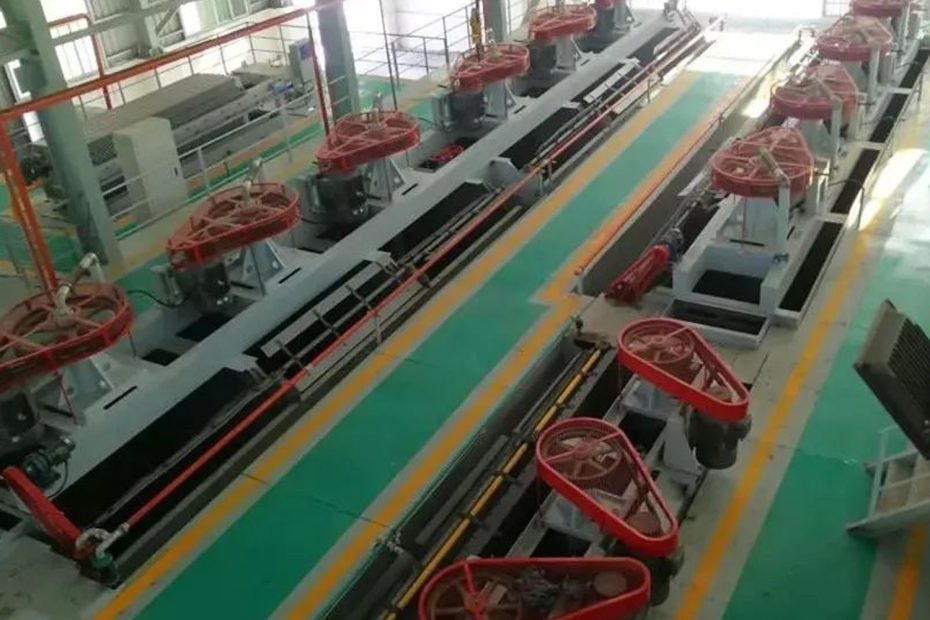Titanium is an important metal with good plasticity and high specific strength. It is of great significance in many fields. The main source of titanium resources is ilmenite. Therefore, the development and utilization of ilmenite is very important. Ferro-titanium The mineral processing methods of ore mainly include gravity separation, magnetic separation, flotation, combined mineral processing and so on.
Describe the four methods of mineral processing of ilmenite
In this article, we will introduce the mineral processing method of ilmenite and help you solve the problem of mineral processing of ilmenite.
Ilmenite gravity separation method
The gravity separation method is to remove the gangue minerals in the ore through jigging, spiral chute, shaking table and other equipment after the ilmenite is crushed. It is mainly suitable for coarse-grained ilmenite.
Ilmenite Magnetic Separation
Because ilmenite has weak magnetism, ilmenite can be separated from non-magnetic minerals by magnetic separation.
If the magnetic field strength is not enough during magnetic separation, some ilmenite minerals will be discarded, resulting in a decrease in resource utilization efficiency. Therefore, in the process of magnetic separation of ilmenite, the magnetic field strength is a very critical factor.
Ilmenite mostly exists in the ore deposit in the form of complex solid solution, and it is easy to produce ilmenite lamellae with higher magnetic susceptibility coefficients, and the magnetization difference with gangue increases, which is easy to be separated by magnetic separation.
Some ilmenite placers contain a lot of impurities and sludge. After primary grinding, this kind of ore can be separated by weak magnetic separation to separate iron ore, and then use strong magnetic separation to separate titanium ore to improve the recovery of ore utilization rate.
Ilmenite flotation method
Flotation is a commonly used separation method for ilmenite, which can be divided into conventional flotation, flocculation flotation, agglomeration flotation and carrier flotation.

Flotation sorting method 1#:Conventional flotation method
Conventional ilmenite beneficiation methods generally use oleic acid, oxidized paraffin soap, tall oil, etc. as ilmenite collectors. The combination and ratio of collectors can be carried out according to different mineral compositions. For example, some ores contain both ilmenite and titanium pyroxene. These two minerals have similar buoyancy, and new collectors can be used to separate them. , Improve ore grade.
Flotation sorting method 2#:Flocculation flotation method
Ilmenite flocculation flotation can also be divided into selective flocculation flotation and hydrophobic flocculation flotation, mainly for ilmenite with finer particle size.
The selective flocculation flotation method is to first condense one mineral in the slurry containing two or more minerals and then gradually separate it. Hydrophobic flocculation flotation method is to use the mutual hydrophobic effect of hydrophobic ore particles to make them agglomerate and then separate.
Flotation sorting method 3#: Reunion flotation method
The ilmenite agglomeration flotation method uses the collector adsorbed on the surface of the ilmenite to make the ilmenite particles hydrophobic, and the capillary gravity of the bridge fluid makes the ore particles agglomerate, thereby realizing the ilmenite flotation, suitable for particle size finer ilmenite.
When using this flotation method, it is necessary to pay attention to the use of the collector and the stirring intensity. These two factors have a direct impact on the recovery of ilmenite.
Combined mineral processing method of ilmenite
Ilmenite often contains a variety of minerals and impurities, such as rutile, zirconite, etc. In order to improve the grade and recovery rate of minerals and realize the comprehensive utilization of minerals, the combined mineral processing method has a better effect than the single mineral processing method.
Currently commonly used ilmenite combined mineral processing methods include magnetic separation + flotation, gravity separation + flotation, magnetic separation + gravity separation, gravity separation – magnetic separation – flotation – electric separation.

Combined mineral processing method 1#:Magnetic separation + flotation method
This kind of mineral processing method is to carry out magnetic separation on ilmenite ore first, throw away some useless gangue minerals, and carry out flotation on magnetic separation concentrate to improve the ore grade and recovery rate of ilmenite concentrate.
Combined mineral processing method 2#:Gravity election + flotation
The gravity separation + flotation method has a good mineral processing effect for ilmenite whose raw ore grade is below 6%, and can also separate the sulfur in ilmenite to improve the utilization rate of ilmenite resources.
Combined mineral processing method 3#:Magnetic separation + gravity separation method
The combination of magnetic separation and gravity separation can reduce the production cost of ilmenite mineral processing, improve the concentrate grade and recovery rate of ilmenite, and effectively increase production efficiency.
Combined mineral processing method 4#:Gravity separation – magnetic separation – flotation – electric separation
If the ilmenite gangue minerals contain titanopyroxene, plagioclase, sulfide minerals, etc., the plagioclase can be removed by gravity separation first, and then desulfurized by flotation, and titanopyroxene can be removed by electroseparation. Improving the grade and utilization rate of ilmenite is a better solution for low-grade ilmenite.
In summary
The above is the mineral processing method of ilmenite. In actual production, due to the complex composition of ilmenite, it is not possible to simply rely on experience to determine the process flow.
It is recommended to analyze the mineral composition and properties of the ore through mineral processing tests, and formulate a scientific and reasonable mineral processing plan based on the test results.
